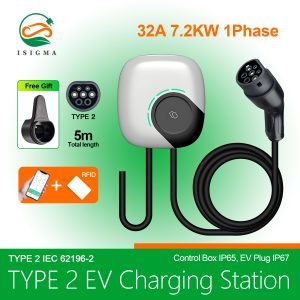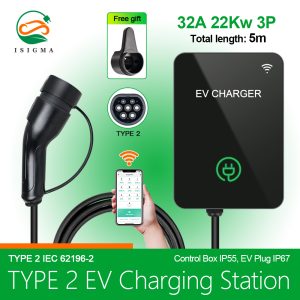
Table of Contents
- Introduction
- Understanding EV Chargers
- 2.1 What is an EV Charger?
- 2.2 Types of EV Chargers
- Why Testing an EV Charger is Important
- Safety Precautions Before Testing
- Tools Required for Testing
- Step-by-Step Guide to Testing an EV Charger
- 6.1 Visual Inspection
- 6.2 Voltage Testing
- 6.3 Current Testing
- 6.4 Ground Fault Circuit Interrupter (GFCI) Testing
- 6.5 Charging Rate Testing
- Troubleshooting Common Issues
- 7.1 Insufficient Charging Power
- 7.2 Overheating
- 7.3 Charging Cable Problems
- How Often Should EV Chargers Be Tested?
- The Importance of Professional Inspections
- Conclusion
- FAQs
- 11.1 Is it safe to test an EV charger without technical knowledge?
- 11.2 Can I use a regular multimeter for testing an EV charger?
- 11.3 How do I know if my EV charger is charging at the correct rate?
- 11.4 What should I do if I encounter a ground fault while testing?
- 11.5 Is there a risk of electric shock when testing an EV charger?
1. Introduction
Electric vehicles (EVs) have gained popularity due to their eco-friendliness and cost-effectiveness. As more EVs hit the roads, the demand for electric vehicle chargers is on the rise. However, like any electrical device, EV chargers require regular testing and maintenance to ensure they function optimally and safely. In this article, we will guide you on how to effectively test an EV charger.
2. Understanding EV Chargers
2.1 What is an EV Charger?
An EV charger, also known as Electric Vehicle Supply Equipment (EVSE), is a device that supplies electrical energy to recharge an electric vehicle's battery. EV chargers come in various types, each catering to different charging needs.
2.2 Types of EV Chargers
- Level 1 Chargers: These chargers use a standard household 120-volt outlet and are suitable for overnight charging at home. They provide a slow charging rate.
- Level 2 Chargers: Operating on a 240-volt power supply, Level 2 chargers offer faster charging compared to Level 1 chargers and are commonly found in public charging stations and homes with dedicated EV charging setups.
- Level 3 Chargers (DC Fast Chargers): These chargers are designed for rapid charging and are typically found in public charging stations. They use direct current (DC) to charge the EV battery directly.
3. Why Testing an EV Charger is Important
Regular testing of EV chargers is essential for several reasons:
- Safety: Ensuring the charger is functioning correctly reduces the risk of accidents, such as electric shock or fire hazards.
- Charging Efficiency: A properly functioning EV charger delivers an efficient charge, optimizing the vehicle's driving range.
- Cost-Effectiveness: Timely identification and resolution of charger issues save repair costs and prevent potential vehicle damage.
4. Safety Precautions Before Testing
Before you begin testing the EV charger, follow these safety precautions:
- Turn off the charger and unplug it from the power source.
- Wear appropriate safety gear, such as insulated gloves and safety goggles.
- If uncertain or uncomfortable, seek the assistance of a qualified electrician.
5. Tools Required for Testing
To test an EV charger, you will need the following tools:
- A digital multimeter capable of measuring AC and DC voltage and current.
- A plug and socket tester.
- A GFCI tester.
- A non-contact voltage tester.
- Safety gloves and goggles.
6. Step-by-Step Guide to Testing an EV Charger
6.1 Visual Inspection
Inspect the charger's exterior for any physical damage, loose connections, or signs of wear. Check the charging cable for fraying or exposed wires.
6.2 Voltage Testing
Using a digital multimeter, test the voltage output of the charger. For Level 1 and Level 2 chargers, the output should match the voltage of the power supply (120V or 240V). Level 3 chargers have higher voltage outputs.
6.3 Current Testing
Measure the charger's current output using the multimeter. Ensure it matches the charger's rated current capacity.
6.4 Ground Fault Circuit Interrupter (GFCI) Testing
Verify if the charger's GFCI is functioning correctly using a GFCI tester.
6.5 Charging Rate Testing
Test the charging rate by plugging in the charger to an EV and monitoring the time it takes to add a certain number of miles to the vehicle's range.
7. Troubleshooting Common Issues
7.1 Insufficient Charging Power
If the charger is not providing the expected power output, check for loose connections or damaged cables. Consider upgrading to a higher capacity charger if needed.
7.2 Overheating
Overheating may indicate a faulty charger or a problem with the electrical supply. Unplug the charger immediately if it overheats and consult a professional.
7.3 Charging Cable Problems
If the charging cable shows signs of damage, it should be replaced promptly to prevent potential hazards.
8. How Often Should EV Chargers Be Tested?
It is recommended to test EV chargers at least once every six months, and after any physical damage or malfunction is noticed.
9. The Importance of Professional Inspections
While regular user testing is beneficial, professional inspections by qualified electricians ensure a thorough evaluation of the charger's safety and efficiency.
10. Conclusion
Regular testing of EV chargers is crucial for safe and efficient charging of electric vehicles. By following the step-by-step guide provided in this article and taking necessary safety precautions, users can ensure their EV chargers function optimally, contributing to a greener future.
11. FAQs
11.1 Is it safe to test an EV charger without technical knowledge?
Testing an EV charger without technical knowledge can be risky. It is best to seek guidance from a professional or an experienced individual.
11.2 Can I use a regular multimeter for testing an EV charger?
Yes, a digital multimeter capable of measuring AC and DC voltage and current is suitable for testing an EV charger.
11.3 How do I know if my EV charger is charging at the correct rate?
You can perform a charging rate test as outlined in this article to ensure your EV charger is charging at the expected rate.
11.4 What should I do if I encounter a ground fault while testing?
If you encounter a ground fault while testing, unplug the charger immediately and seek professional assistance to resolve the issue.
11.5 Is there a risk of electric shock when testing an EV charger?
Yes, there is a risk of electric shock when testing an EV charger. Always follow safety precautions and consider seeking professional help if uncertain.





